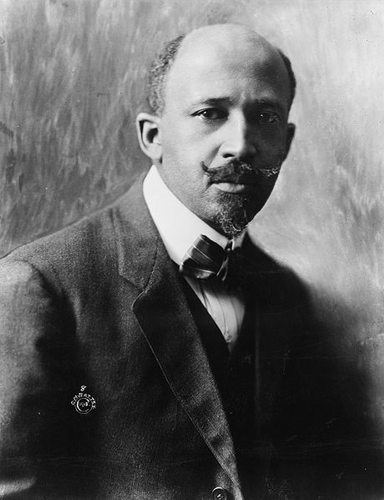|
|
|
W.E.B. Du Bois (1868–1963). (Wikimedia Commons) |
W.E.B. Du Bois was born in Massachusetts in 1868. He attended racially integrated elementary and high schools and went off to Fiske College in Tennessee at age 16 on a scholarship. Du Bois completed his formal education at Harvard with a Ph.D. in history.
Du Bois briefly taught at a college in Ohio before he became the director of a major study on the social conditions of blacks in Philadelphia. He concluded from his research that white discrimination was the main reason that kept African Americans from good-paying jobs.
In 1895, black educator Booker T. Washington delivered his famous “Atlanta Address” in which he accepted segregation but wanted African Americans to be part of the South’s economy. Two years later, Du Bois wrote, “We want to be Americans, full-fledged Americans, with all the rights of American citizens.” He envisioned the creation of an elite group of educated black leaders, “The Talented Tenth,” who would lead African Americans in securing equal rights and higher economic standards.
Du Bois attacked Washington’s acceptance of racial segregation, arguing that this only encouraged whites to deny African Americans the right to vote and to undermine black pride and progress. Du Bois also criticized Washington’s approach at the Tuskegee Institute, a school for blacks that Washington founded, as an attempt “to educate black boys and girls simply as servants and underlings.”
Lynchings and riots against blacks led to the formation in 1909 of the National Association for the Advancement of Colored People (NAACP), an organization with a mainly black membership. Except for Du Bois who became the editor of the organization’s journal, The Crisis, the founding board of directors consisted of white civil rights leaders.
The NAACP used publicity, protests, lawsuits, and the editorial pages of The Crisis to attack racial segregation, discrimination, and the lynching of blacks. Booker T. Washington rejected this confrontational approach, but by the time of his death in 1915 his Tuskegee vision had lost influence among many African Americans.
By World War I, Du Bois had become the leading black figure in the United States. But he became disillusioned after the war when white Americans continued to deny black Americans equal political and civil rights. During the Great Depression of the 1930s, Du Bois increasingly advocated socialist solutions to the nation’s economic problems. He also questioned the NAACP’s goal of a racially integrated society. This led to his resignation as editor of The Crisis in 1934.
Du Bois grew increasingly critical of U. S. capitalism and foreign policy. He praised the accomplishments of communism in the Soviet Union. In 1961, he joined the U.S. Communist Party. Shortly afterward, he left the county, renounced his American citizenship, and became a citizen of Ghana in Africa. He died there at age 95 in 1963.
Du Bois never took part in the Civil Rights Movement of the 1950s and 60s, which secured many of the rights that he had fought for during his lifetime.
For Further Reading
Wolters, Raymond. Du Bois and His Rivals. Columbia, Mo.: University of Missouri Press, 2003.


